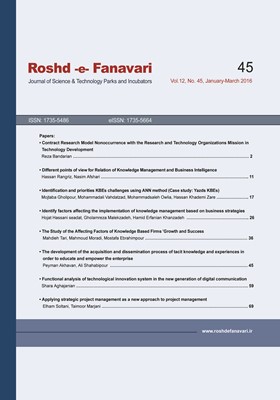Contract Research Model Nonoccurrence with the Research and Technology Organizations Mission in Technology Development
Subject Areas : Technology Management
1 - پژوهشگاه صنعت نفت
Abstract :
Due to the Research and Technology Organizations (RTOs) lack of relation with industry and their tendency to do activities more closer to the universities, which had led to their inefficiency in carrying out their primary mission, since thirty years ago, governments in many countries by cuts the RTOs governmental budget have directed them to financing through industry research budgets, and in some cases, through cut the state budgets, the RTOs were forced to acquiring income (in order to self-sufficiency). Accordingly, another type of research organizations as Contract Research Organizations (CRO) was formed. In this paper, in order to answer the question of whether a contract research model is consistent with the RTOs mission in technology development or not. First, the issue had reviewed historically and then the process of contract research and independent research and their characteristics were investigated and based on that the conclusions and recommendations are offered. The results shows that carrying out the technology development research by the RTOs in the form of a contract research between the industry firms and the RTOs, due to conflict with the requirements of technology development and working conditions of the RTOs is not a good choice and independent research approach is recommended as the most suitable method.
1- بندريان، رضا، "رويكردي تحليلي به چيستي و چرايي سازمانهاي پژوهش و فناوري مستقل". فصلنامه رشد فناوري، سال ششم، شماره 23، صص 39-54، 1389.#
2- ضیائی، مظاهر، "دانش نوآوری و توسعه دانائیمحور؛ نگاهی به نقش سازمانهای پژوهش و فناوری"، انتشارات پژوهشكده مهندسي جهاد كشاورزي، 1387.#
3- بندريان، رضا، کريمی، دستجردی داود، جعفرنژاد، احمد، "الگوی مديريت راهبردی توسعه فناوری در سازمانهای پژوهش و فناوری در صنعت نفت: موردی از پژوهش آميخته". سیاست علم و فناوری، 4 (3)، صص 39-56، 1391.#
4- Koch, G. R., Leitner, K. H., Bornemann, M., “Measuring and reporting intangible assets and results in a European Contract Research Organization”, Benchmarking Industry-Science Relationships Conference, Berlin, 2000.#
5- Cesaroni F., Minin D. A., P. Andrea, “New Strategic Goals and Organizational Solutions in Large R&D Labs: Lessons from Centro Ricerche Fiat and Telecom Italia Lab”. R&D Management, Vol. 34, No. 1, pp. 45-56, 2004.#
6- Technopolis, (2005). “appendix A: RTOs and international engagement in science and innovation”. Available: http://webarchive.nationalarchives.gov.uk/20060905011127/dti.gov.uk/files/file30064.pdf#
7- Hall, A., Bockett, G., Taylor, S., Sivamohan, M.V.K., Clark, N., “Why Research Partnerships Really Matter: Innovation Theory, Institutional Arrangements and Implications for Developing New Technology for the Poor”, World Development, 29(5), pp. 783–97, 2001.#
8- Leydesdorff, L., Meyer, M., “Triple Helix Indicators of Knowledge-Based Innovation Systems: Introduction to the Special Issue”, Research Policy, 35(10), pp. 1441–49, 2006.#
9- Sanz-Menéndez, L., Cruz-Castro, L., “Coping with Environmental Pressures: Public Research Organizations Responses to Funding Crisis”. Research Policy, 32(8), pp. 1293–308, 2003.#
10- Buenstorf, G., “Is Commercialization Good or Bad for Science? Individual-level Evidence from the Max Planck Society”. Research Policy, 38(2), pp. 281–92, 2009. #
11- Cooper, W. W., McAlister, L., “Can research be basic and applied? You bet. It better be for B Schools”. Socio-Economic Planning Sciences, pp 256-276, 1999. #
12- Schmid, U., “Applied Research: A Scientist's Perspective. Annual Reviews in Control”. 25, pp 183-190, 2001.#
13- Meredith, S., Burkle, M., “Building Bridges between University and Industry: theory and practice”. Education and Training, 50(3), pp. 199-215, 2008. #
14- Vavakova, B., “Reconceptualizing Innovation Policy: The Case of France”. Technovation, 26(4), pp. 444–62, 2006.#
15- Cesaroni, F., Minin, D. A., Andrea, P., “New Strategic Goals and Organizational Solutions in Large R&D Labs: Lessons from Centro Ricerche Fiat and Telecom Italia Lab”, R&D Management, Vol. 34, No. 1, pp. 45-56, 2004.#
16- Leitner, K-H, Warden, C., “Managing and reporting knowledge-based resources and processes in research organisations: specifics, lessons learned and perspectives”. Management Accounting Research, 15, pp. 33–51, 2004.#

